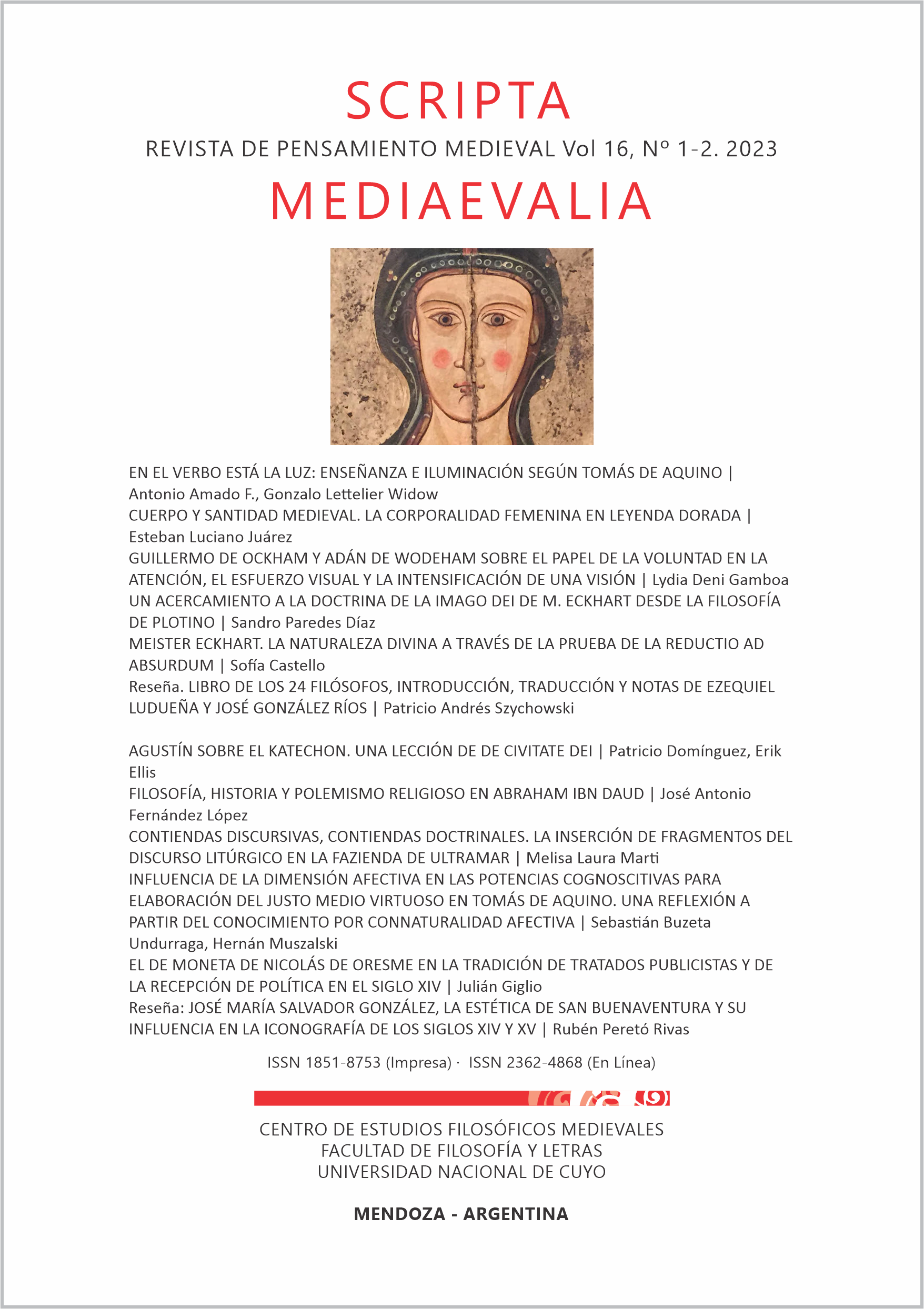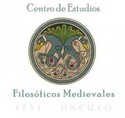Meister Eckhart. Divine Nature by the reductio ad absurdum argument
DOI:
https://doi.org/10.48162/rev.35.027Keywords:
Axiomatic Method, Scholastics, Divine Nature, Reductio ad absurdum, MediationAbstract
By a peculiar axiomatic method, Meister Eckhart presents in a selection of passages certain properties of the divine nature through the logical resource of the reductio ad absurdum. After stating that being, unity and infinity are characteristics of the divine essence, Eckhart proposes to develop arguments that have as premises precisely the negation of these. In doing so, all reasoning invariably falls into contradiction. Thus, this paper points out, firstly, methodological considerations that highlight the peculiarity of an axiomatic system in the framework of the Scholastic, on the one hand, and discuss the relationship between this positive predication about God and the via negativa, which would seem to deny the possibility of doing so, on the other. Secondly, it presents the selected arguments. These, in turn, allow us to observe the metaphysical system that operates as the foundation of Eckhartian thought.
References
Andolfo, M. “Il contributo del neoplatonismo al quadro argomentativo anagogico in filosofia e teologia.” Divus Thomas 119/1 (2016): 180-218.
Beccarisi, A. “Proclus and the Liber de causis in Meister Eckhart’s Works.” En Reading Proclus and the Books of Causes, vol. II, editado por D. Calma, 340-375. Brill: Leiden/Boston, 2021.
Beierwaltes, W. “Eckahrt et le Livre des Causes, L’Être comme premier-créé, la possibilité de penser et d’exprimer la causa prima.” Revue des sciences religieuses 68/2 (1994): 159-172.
Connolly, J. Living without why. Meister Eckhart’s Critique of the Medieval Concept of Will. New York: Oxford University Press, 2011.
De Brugger, I. trad., Meister Eckhart, Tratados y sermones. Buenos Aires: Las Cuarenta, 2013.
De Libera, A. “Langage negativ et negativité chez Maître Eckhart.” En The Word in Medieval Logic, Theology and Psychology, Acts of the XIIIth International Colloquium of the S.I.E.P.M., Kyoto, 2005, editado por T. Shimizu y C. Burnett, 403-427. Turnhout: Brepols, 2009.
Flasch, K. Meister Eckhart, Philosopher of Christianity. New Haven/London: Yale University Press, 2011.
Hackett, J. y Hart Weed, . “From Aquinas to Eckhart on Creation, Creature, and Analogy.” En A Companion to Meister Eckhart, editado por J. Hackett, 205-235. Leiden/Boston: Brill, 2013.
Kelley, C. Eckhart On Divine Knowledge. New Haven/London: Yale University Press, 1977.
Kobusch, T. “Lesemeistermetaphysik – Lebemeistermetaphysik. Zur Einheit der Philosophie Meister Eckharts.” En Meister Eckhart in Erfurt. Miscellanea Mediaevalia, Bd. 32, Veröffentlichungen des Thomas-Instituts der Universität zu Köln, editado por A. Speer, A. y L. Wegener, 239-258. Berlin/New York: Walter de Gruyter, 2005.
Koch, . “Kritische Studien zum Leben Meister Eckharts.” En Kleine Schriften, vol.1, editado por J. Koch, 247-347. Roma: Storia e Letteratura. Raccolta di Studi e Testi 127, 1973.
Koch, . “Zur Analogielehre Meister Eckharts.” En Mélanges offerts à Etienne Gilson de l’Académie française, editado por C. Edie, 327-350. Toronto: Pontifical Institute of Mediaeval Studies/ Paris: Vrin, 1959.
Meister Eckhart, Lateinische Werke, Bd. 1,1 (Prologus in Opus tripartitum, Prologus in Opus propositionum), herausgegeben und übersetzt von Konrad Weiß. Stuttgart: Kohlhammer, 1965.
Meister Eckhart, Lateinische Werke, Bd. 2 (Expositio libri Exodi), herausgegeben und übersetzt von Konrad Weiß, Heribert Fischer, Josef Koch und Loris Sturlese. Stuttgart: Kohlhammer, 1992.
Mojsisch, B. “Die Theorie des Ich in seiner selbst – und Weltbegründung bei Meister Eckhart.” En L’homme et son univers au Moyen Âge, Actes du septième congrès international de philosophie médiévale, sept. 1982, editado C. Wenin, 267-272. Louvain-la-Neuve: L'Institut Superieur De Philosophie, 1986.
Mojsisch, B. Meister Eckhart. Analogy, Univocity and Unity. Amsterdam/Philadelphia: B.R. Grüner, 2001.
Palazzo, A. “‘Ez sprichet gar ein hôher meister’: Eckhart e Avicenna.” En Studi sulle fonti di Meister Eckhart, vol. I., editado por L.
Sturlese, 71-111. Freiburg: Academic Press Fribourg, 2008.
Palazzo, A. “Eckhart’s Islamic and ewish Sources: Avicenna, Avicebron, and Averroes.” En A Companion to Meister Eckhart, editado por J. Hackett, 253-298. Leiden/Boston: Brill, 2013.
Porro, P. “The University of Paris in the thirteenth century.” En Interpreting Proclus, from Antiquity to the Renaissance, editado S. Gersh, 264-298. Cambridge, Cambridge University Press, 2014.
Quero Sánchez, A. “El hombre, ‘propiedad de la libertad’: la metafísica de la libertad del Maestro Eckhart.” Revista Española de Filosofía Medieval 11 (2015): 11-27.
Quero Sánchez, A. “Meister Eckhart’s Treatise On Being, What Is, And Nothing, And The Relationship Between His Commentaries On Genesis (Expositio On Genesis And Book Of The Parables Of Genesis).” Revista Española de Filosofía Medieval 23 (2016): 259-290.
Quero Sánchez, A. Sermones y lecciones sobre el capítulo 24, 23-32 del Eclesiástico. Navarra: EUNSA, 2010.
Rubino, E. “Pseudo-Dionysius the Areopagite and Eckhart.” En A Companion to Meister Eckhart, editado por J. Hackett, 299-309. Leiden/Boston: Brill, 2013.
Ruh, K. “Die ‘Mystica Theologia’ des Dionysius Pseudo-Areopagita im Lichte mittelalterlicher Kommentatoren.” eitschrift f r deutsches Altertum und deutsche Literatur 122 (1993): 119–145.
Ruh, K. “Dionysius Areopagita im deutschen Predigtwerk Meister Eckharts.” Perspektiven der Philosophie. Neues Jahrbuch 13 (1987): 207–223.
Ruh, K. Meister Eckhart. Theologue – Prediger – Mystiker. Münich: C. H. Beck, 1989.
Sturlese, L. “Meister Eckhart, ein Porträt.” En Homo Divinus: Philosophische Projekt ein Deutschland Zwischen Eckhart Und Heinrich Seuse, editado por L. Sturlese, 15-34. Stuttgart: Kohlhammer, 2007.
Suárez-Nani, T. “Appunti sulla metafisica nel pensiero medievale: tra Aristotele e Descartes.” Scripta Mediaevalia 11/2 (2018): 13-41.
Tsopurashvili, T. “The Theory of the Transcendentals in Meister Eckhart.” En A Companion to Meister Eckhart, editado por J. Hackett, 185-203. Leiden/Boston: Brill, 2013.
Vinco, R. “Meister Eckhart’s Non-standard Natural Theology.” Neue Zeitschrift für Systematische Theologie und Religionsphilosophie 58/4 (2016): 473-488.
Williams, D. “Meister Eckhart and the Varieties of Nothing.” Medieval Mystical Theology 20/1 (2011): 85-98.
Downloads
Published
How to Cite
Issue
Section
License

This work is licensed under a Creative Commons Attribution-NonCommercial-ShareAlike 3.0 Unported License.






































